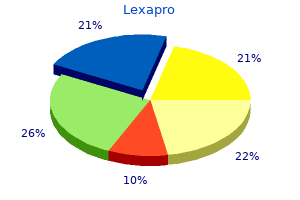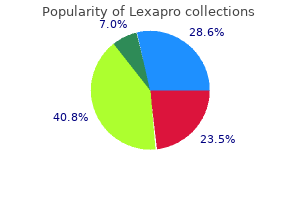Lexapro
"Generic lexapro 5 mg on-line, depression definition yahoo".
By: U. Reto, M.B. B.CH. B.A.O., Ph.D.
Medical Instructor, Midwestern University Arizona College of Osteopathic Medicine
Extraneous rhythms such as digestion and physiological measures influenced by external factors major depression inventory test cheap 20mg lexapro fast delivery. Jet lag is generally absent by the time the core temperature curve is restored to its normal rhythm depression experts buy lexapro 20mg with amex. During the period when the body clock is adjusting to the new time zone anxiety reddit purchase lexapro 20 mg on-line, the individual is vulnerable to decrements in performance depression fracture definition buy discount lexapro 10mg. During this time, light exercise rather than strenuous training or competitive matches is advised, in order to reduce the risk of injury A 220 220 220 Self-chosen work-rate (w) 220 220 220 220 220 00. Errors that occur may go undetected and mistakes in decision-making during play may not be recognised as such. In their study of travellers between the United Kingdom and New Zealand, Reilly and Mellor demonstrated that the normal circadian rhythm in muscle strength was reversed for up to one week. Travellers to Australia from the United Kingdom showed symptoms of jet lag for eight to nine days after arrival, having crossed ten time zones. Similarly, Olympic Games athletes demonstrated disrupted rhythms in leg and back strength for five days (see Figure 2. Where trips are over fewer than two to three time zones, the effects of jet lag are small but nevertheless call for attention. One solution is to behave as if on home time throughout the visit, that is, according to body clock time. Adjustments need to be made for waking time, the timing of meals and training sessions, and the time of retiring to bed. This strategy may be used by teams from the English Premier League playing in continental Europe in midweek and in the domestic league during the preceding and the following weekend. It should be possible to organise daily activity over this period according to body-clock time. The task of staying on home time becomes much more difficult when multiple time zones, more than four, are crossed due to the problems in avoiding and seeking exposure to light at the appropriate times. In this instance, the solution is to arrive in good time for adjustment of the body clock to have occurred by the time of competition. Pre-adjustment of the body clock in advance of travelling is not a viable option for competitive footballers. Such a phase shift of the normal circadian rhythm induces a malaise similar to that experienced by nocturnal shift workers. These symptoms could compromise training in the days before departure; furthermore, the manoeuvre leads to a partial adjustment only. Nevertheless, a shift of one to two hours for one to two days prior to long-haul flights could be of benefit when a large phase advance is required, by ensuring the physiological adjustment is initiated in the correct direction. There is no physiological adaptation to repeated disturbances of the circadian rhythm, so individuals do not necessarily adjust any better (or worse) than in previous journeys. Airline staff as well as occasional travellers experience jet lag, although the long-term health consequences of frequent long-haul flights are unknown. Female flight attendants experience secondary amenorrhea, linked to interactions between female reproductive hormones and altered melatonin rhythms. Female football players are as vulnerable as their male counterparts to effects of jet lag but the syndrome has not been examined in detail in this group. Pharmacological approaches to adjustment Pharmacological agents have been proposed as a first line means of ameliorating the effects of jet lag. These substances include both stimulants and soporifics, although effectiveness depends on their phase-shifting properties i. Extracts of melatonin and its synthetic analogues have gained in usage but as yet no single pill has been identified as an antidote to jet lag. Some substances used in military contexts for countering jet lag might be considered for use by athletes. These drugs include treatments for narcolepsy, attention deficit disorder and other conditions with modafinil (banned in-competition for athletes), methylphenidate, pemoline, and related agents. Caffeine may help maintain daytime alertness but can cause unwanted effects in recovery sleep if taken too late in the evening. Benzodiazepines are the drugs used in sleeping pills and known as the minor tranquillisers; they are helpful in initiating sleep but not necessarily maintaining it. Benzodiazepines such as diazepam and loprazolam have longer half-lives than temazepam and can cause hangovers that impair performance the following morning. So-called non-benzodiazepines like zolpidem interfere less 1600 Leg strength (N) 1500 1400 1300 07.
Although the mechanisms behind these effects are poorly understood depression hotline cheap lexapro 5 mg fast delivery, it seems likely that encoding and maintenance processes are the most affected depression line definition cheap 5 mg lexapro mastercard. Furthermore depression symptoms for dogs buy 10mg lexapro mastercard, little is known about what stage in the process this depletion or occupation takes place anxiety pressure points buy generic lexapro 10 mg line. Few, if any, studies have attempted to separate these dimensions within memory processes while under stress conditions. There are a variety of tasks and putative stressors under which memory has been measured. Anxiety is perhaps the most common stress condition under which researchers have examined memory performance. These assert that worry and intrusive thoughts compete for a limited pool of resources. This competition necessarily results in fewer available resources that can be devoted to the primary task. The reduction in cue sampling may in turn result in a reduction in the number of items encoded into memory, thus further reducing the number or range of possible target items available for later recollection. The effects of divided attention on memory performance may be significantly related to this discussion. Analogous to the role of anxiety described previously, secondary tasks require and draw away resources and attention from the primary task. In such cases when the recall or recognition of information is required, this division often results in a decreased capacity to recall or recognize information. It has been demonstrated that dividing attentional resources has a direct negative effect on the encoding of information, although research suggests that several mechanisms may be at work. For example, divided attention may lead to a reduction in the time available to process incoming stimuli (due to time devoted to a secondary task) or it may result in reduced depth of processing and less elaborative coding. Several consistent observations have been made concerning memory for emotional events. First, memory tends to be impaired temporarily when recalling information prior to or following an emotional event. Second, memory for a targeted emotional event may or may not be impaired under stressful conditions; however, there is a tendency for improved recall of central features when such events are emotional as compared to neutral. It has been argued that such memories result from a combination of selective attention, preattentive bias, and post-event elaboration. Third, peripheral details are less often remembered when the main events witnessed are emotional in nature. Specifically, memory improves when retrieval conditions are congruent with encoding conditions. Finally, research points to the notion that individuals may be predisposed or primed toward emotionally valent information. The hippocampus is also implicated in the human stress response and the activation of glucocorticoids. Moreover, exposure to high doses of cortisol (a known marker of the human stress response) has also been found to block hippocampal potentiation. Thus, the hormonal stress response may cause direct effects on the brain structure mediating some memory functions. These neurophysiological and electrophysiological relationships appear to be the most promising link to an underlying biological mechanism and process at this time. Tasks that are well-learned tend to be more resistant to the effects of stress than those that are less well-learned. Furthermore, when tasks are practiced and well-learned, they are likely to be committed to long-term memory, and through their frequent use (activation, rehearsal, and recollection) more easily remembered. Several authors have demonstrated that this kind of practice leads to automaticity and the proceduralization of tasks. Thus, these over-learned behaviors tend to require less attentional control and fewer mental resources, which further results in enhanced performance and greater resistance to stress. It is generally accepted that under stress, individuals tend to revert back to earlier well-learned responses. This appears to be true when these previously learned strategies or knowledge sets are over-learned and have greater availability in memory, easing their retrieval. This finding may relate to interference or disruption in the encoding and/or maintenance phases of working memory.
Purchase lexapro 5 mg on-line. 110+ Best Semicolon Tattoos & Designs With Meanings.

Phaseolus max Soja hispida (Soy). Lexapro.
- Reducing protein in the urine of people with kidney disease.
- What is Soy?
- Preventing and treating diabetic nerve problems.
- How does Soy work?
- Heart disease.
- Are there safety concerns?
- Reducing the risk of developing breast cancer.
- Reducing the duration of diarrhea in infants.
Source: http://www.rxlist.com/script/main/art.asp?articlekey=96936
The Yameen government had made no progress in investigating the abduction of journalist Ahmed Rilwan anxiety 30000 cheap 10mg lexapro fast delivery, who was last seen in August 2014 depression definition for business discount 20 mg lexapro, or the murder of Yameen Rasheed depression test dansk buy lexapro 10mg low cost, a blogger and activist who was stabbed to death in April 2017 depression symptoms of anger discount lexapro 5mg line. At a campaign rally on August 7, 2018, Yameen declared that Rilwan was dead-a claim he later retracted. On November 18, President Solih established a commission to investigate both cases, chaired by a former attorney general, Husnu Al Suood. Maldivian law bans sexual harassment in the workplace, but the law is seldom enforced. Trafficking of Women and Children the Maldives is both a destination and a source country for women and children subjected to forced labor and sex trafficking. Ties with India deteriorated after New Delhi criticized the government crackdown on the opposition and the declaration of a state of emergency. After the election, President-elect Solih vowed to restore good relations with India. Following the election, China called for "continuity and stability" in its relations with the Maldives. During the campaign, Solih had vowed to review all Chinese projects in the Maldives. Sexual Orientation and Gender Identity the Maldivian penal code criminalizes adult, consensual same-sex sexual conduct; the punishment can include imprisonment of up to eight years and 100 lashes. Human Rights Defenders Social media trolls and thugs, some with links to the ruling party, have threatened human rights defenders because of their work. In January 2018, Shahindha Ismail, the executive director of the Maldivian Democracy Network, received threats on social media after an online news site branded her an apostate for a statement promoting religious freedom. Key International Actors the February 2018 declaration of a state of emergency was widely condemned internationally. The United Nations high commissioner for human rights, among the first to speak out, described the crackdown as "an all-out assault on democracy. The peace process envisioned to end the 2012-2013 political-military crisis in the north made scant progress, including on disarmament and the restoration of state authority. In central Mali, Islamist group attacks, including with explosive devices on roadways, increased from 2017, killing many villagers. State counterterrorism operations resulted in dozens of summary executions and ill-treatment. During 2018, at least 300 civilians were killed in over 100 incidents of communal violence in central and northern Mali. The violence pitted ethnically aligned selfdefense groups against communities accused of supporting Islamist armed groups, resulting in the pillage and destruction of dozens of villages and displacement of tens of thousands. In September, President Ibrahim Boubacar Keita was sworn in for a second term after winning elections marred by insecurity, allegations of irregularities, and some rights violations, including banned demonstrations and the closure of a local radio station. Little effort was made toward providing justice for victims of abuses, and rule of law institutions remained weak. However, the military opened investigations into allegations of extrajudicial killings by their forces. Humanitarian agencies suffered scores of attacks, mostly by bandits, which undermined their ability to deliver aid. These actors demonstrated increased willingness to denounce abuses by Malian security forces. Scores of civilians were killed in these attacks, primarily by the indiscriminate use of improvised explosive devices planted on major roads, including an attack in Mopti Region that killed 26. Islamist armed groups continued to threaten, and sometimes kill, villagers deemed to have collaborated with authorities and beat those engaged in cultural practices they had forbidden. They also imposed their version of Sharia (Islamic law) via courts that did not adhere to fair trial standards. During the elections, they burned polling stations and election materials, killed at least three election workers, and threatened voters, forcing the closure of hundreds of polling stations in north and central Mali. Numerous children who fled their villages during attacks by ethnic militias, including Boumbo and Gueourou, remain missing. Thousands of children suffered from malnutrition as a result of conflict and intercommunal violence. In February, Mali adopted the Safe Schools Declaration, a political commitment to reduce attacks on education.

Elaboration occurs during or following the initial encoding of the stimulus and is likely to involve the rehearsal of various event features depression numbness generic 20mg lexapro with amex. It has been shown to make memory for such events more resilient and less likely to be forgotten-flashbulb memories are believed to be one result of this type of elaborative process depression hormone test buy cheap lexapro 10mg on-line. In order to test the hypothesis that post-stimulus elaboration plays an active role in the memory of emotional events depression symptoms of sickness purchase 5 mg lexapro otc, the authors exposed subjects to both positively and negatively valent stimuli depression usernames discount lexapro 20mg amex. The series of slides used for their examination were selected from the International Affective Picture System and were rated for their arousal properties (high and low) as well as their emotional valence. Subjects were broken into two groups, an elaboration group and a distraction group. Both groups were exposed to the series of pictorial slides; however, subjects in the distraction group were shown a distractor slide between each target slide that required them to perform a series of math problems (blocking the likelihood for elaboration). The elaboration group was shown a blank slide between target slides, allowing for elaboration to take place, before proceeding to the next slide. After the series of slides had been presented, both groups performed a brief filler task that was followed by a cued recall test. The results of the study indicated that positively valent images tended to be remembered better than negatively valent images (although both types of valenced images were recalled more often and in more detail than neutral stimuli). Images that were rated as highly arousing also tended to be remembered over those rated as low-arousing. In addition, memory for central-features was better than memory for peripheral details. Their data suggested that only negatively valent stimuli were elaborated by subjects. This finding was irrespective of arousal-level which indicates that what enhances recall of emotional events is not necessarily arousal, but instead, may be the emotional valence (positive or negative) of the event. The authors speculated that this finding can be explained from an evolutionary perspective. For example, it may be more adaptive to initially respond based on the valence of an event when it is negative than based on arousal cues, which may reflect either a positive or negative event. Similarly, in addressing why elaboration occurred for negative images and not for positive images, the authors suggested that negative stimuli may present an evolutionary priority over positive stimuli. These authors constructed six experiments to test their hypothesis that subjects would be more likely to remember details associated with emotional words as compared to neutral words. Furthermore, they compared two types of subjective memory experience, remembering and knowing. Remembering, or recollection, has been described as a "slower attentiondemanding process" that typically includes item-specific details. The second, knowing, which is based on familiarity, has been characterized as "faster and more automatic," a remembrance or feeling that one has been acquainted with the stimulus in the past (p. Distinguishing between these two types of memory experience is typically done by asking subjects whether they remember, or simply know, they have been exposed to the stimulus. Remembering the stimulus usually portends a specific and detailed memory whereas knowing suggests a sense of previous encounter without any specific detail for the item remembered. Neuroimaging research in this area has contributed to the differentiation between these two states; remembering is associated with left-sided prefrontal areas and the hippocampus and knowing is connected with the right-sided prefrontal region and the parahippocamal gyrus (Kensinger, Clarke, & Corkin, 2003). During a self-paced recognition task, subjects were asked whether they had a vivid recollection of the word, whether they knew the word was familiar to them, or whether they thought the word was new. The results of their first experiment indicated that words rated as negative were remembered more often than those rated as neutral. This enhancement effect was predominantly true for words that subjects vividly recalled (remembered types). The authors concluded that negative words had a tendency to increase the vividness of the memories recalled, although both recollection and familiarity occurred more often for negative than neutral words. In subsequent experiments, Kensinger and Corkin (2003) assessed different measures of memory richness, varying levels of arousal and valence, and varying degrees of semantic association between words. A similar pattern emerged across all variations of study: memory details were more likely to be remembered for emotional than neutral words. Words that were rated as having a stronger valence as well as evoking greater arousal were remembered most accurately and in greater detail than neutral words. Words that were rated as arousing showed the greatest recall enhancement (over those that were rated as highly valent); however, the results of these studies demonstrate that physiological arousal is not necessary for the recall enhancement effect.


